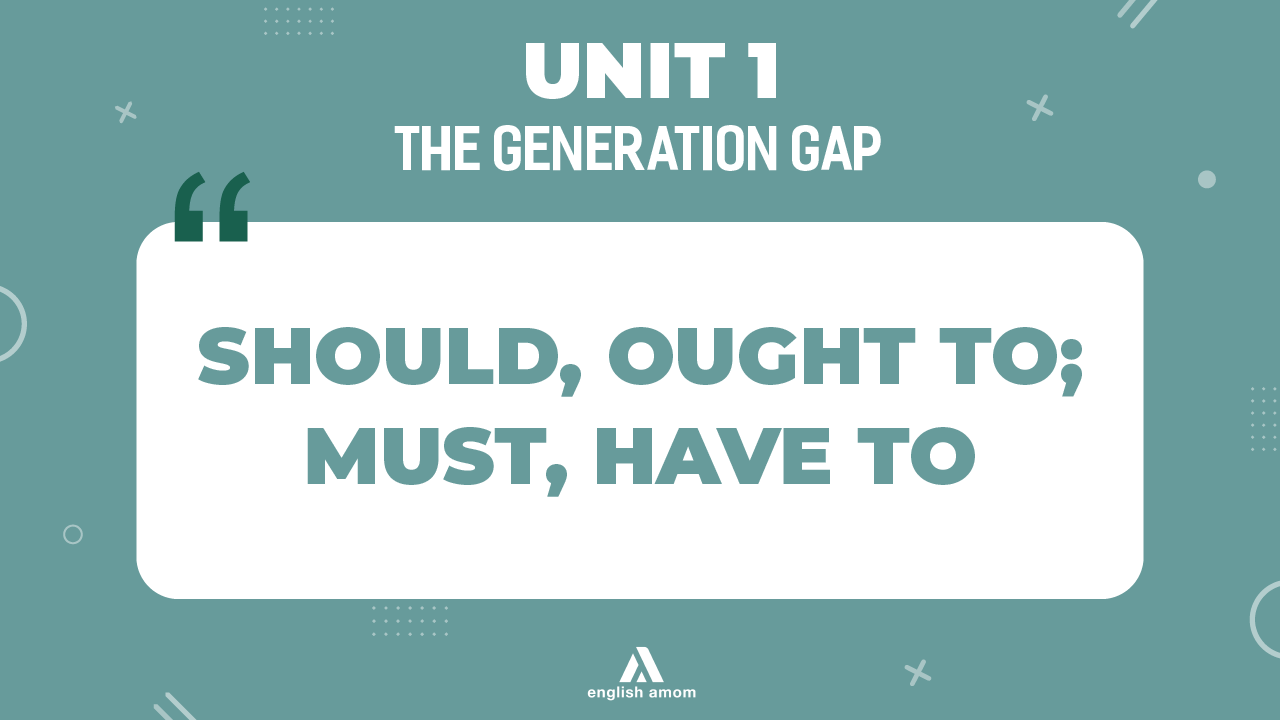
► Kênh hỏi đáp và giải thích thắc mắc kiến thức MIỄN PHÍ → truy cập LINK NHÓM: ENGLISH AMOM
► Kênh YOUTUBE hệ thống toàn bộ bài giảng CLIPS: truy cập LINK: ENGLISH AMOM CHANNEL
► Kênh TIKTOK: ENGLISH AMOM
I) LÝ THUYẾT
A) SHOULD
► Xem lại lý thuyết và làm các bài tập thực hành của SHOULD
B) OUGHT TO
1) Cấu trúc
S + ought to + V-infinitive
Ví dụ: You ought to do your homework before going to class.
2) Cách dùng
► Ought to được dùng để nói về bổn phận của ai đó, khi người nói muốn nhắc đến một hành động, sự việc đáng lẽ phải xảy ra nhưng không làm. Ý nghĩa của cấu trúc này giống với should.
Ví dụ: Parents ought to pay more attention to their children. (Cha mẹ nên chú ý hơn đến con cái của mình.)
► Ought to được dùng để nói về sự suy diễn, suy luận của chúng ta về một vấn đề nào đó. Hoặc dùng để kết luận một vấn đề nào đó khi nó diễn ra một cách hợp lý và có kết quả.
Ví dụ: She ought not to come here because she’s sick. (Cô ấy sẽ không đến đây vì cô ấy bị ốm.)
► Cấu trúc ought to không có dạng quá khứ. Tuy nhiên để nói về một việc làm đã qua trong quá khứ chúng ta có thể sử dụng cấu trúc ought to have + past participle.
Ví dụ: I ought to have brought the cake back but I left it at the store. (Đáng lẽ tôi phải mang bánh về nhưng tôi đã để quên nó ở cửa hàng.)
► Cấu trúc ought to còn có được sử dụng để nói về một việc đáng lẽ phải được thực hiện, xảy ra ngay tại thời điểm nói hay một khoảng thời gian trong tương lai nào đó.
Ví dụ: He ought to be at the airport by now. (Anh ấy đáng lẽ phải ở sân bay giờ này chứ.)
C) MUST
► Xem lại lý thuyết và làm các bài tập thực hành của MUST
D) HAVE TO
► Xem lại lý thuyết và làm các bài tập thực hành của HAVE TO
II) BÀI TẬP
1. Underline the correct word to complete the sentences. (Page 9)
1. I think you should / shouldn't talk to your parents about it. I'm sure they will give you the best advice.
2. I don't think you ought / ought not to do your brother‘s homework. He must do it himself
3. You must / mustn't finish your homework before you go out with your friends.
4. At our school, we have to / don't have to wear uniforms. It is a rule.
5. You mustn't / don't have to take photographs here. This is a restricted area.
ĐÁP ÁN:
| 1. shoud | 2. ought | 3. must | 4. have to | 5. mustn't |
2. Rewrite each of the sentences without changing its meaning, using the word in brackets. (Page 9)
1. It would be a good idea for you to talk to your parents about your problem. (ought)
► You ought to talk to your parents about your problem.
2. You are not allowed to use your mobile phone in the examination room. (must)
► ............................................................................................................................
3. It is not necessary for me to type my essay. (have to)
► ............................................................................................................................
4. I'd advise you to tell the truth to your family. (should)
► ............................................................................................................................
5. It is necessary for young people to plan their future career carefully. (must)
► ............................................................................................................................
ĐÁP ÁN:
2. You mustn't use your mobile phone in the examination room.
3. I don't have to type my essay.
4. You should tell the truth to your family.
5. Young people must plan their future career carefully.
3. Complete the following sentences with should or ought in either positive or negative form. (Page 16)
1. I'm having so much fun at the party, but I .............................. go home now to revise the grammar points for my English test tomorrow.
2. Your English is very good. You .............................. worry so much. You .............................. relax now.
3. I have prepared carefully for the test. I know I .............................. panic, but I can't help it.
4. You .............................. create problems for yourself now. Instead, you .............................. take a break.
ĐÁP ÁN:
| 1. ought | 2. shouldn't - ought | 3. shouldn't | 4. oughtn't - should |
4. Complete the following sentences with must / mustn't or have to / has to and don’t have to /doesn't have to. (Page 16)
1. I .............................. wash up after dinner, and my brother .............................. clean the floor. That's the rule in my family.
2. You .............................. argue with your father all the time. Try to listen to his advice.
3. You .............................. wear a nice dress tonight. You can't go to the concert in these old jeans.
4. I like Sundays because I .............................. get up early.
ĐÁP ÁN:
| 1. have to - has to | 2. mustn't | 3. must | 4. don't have to |

